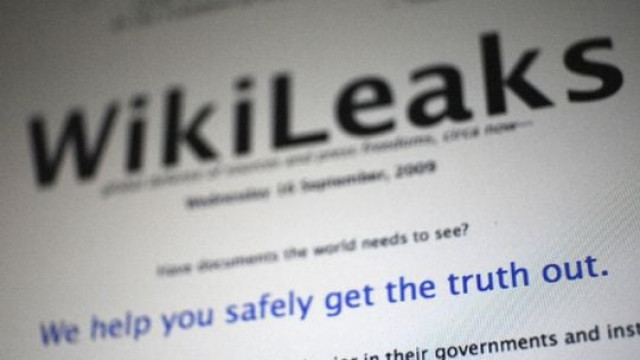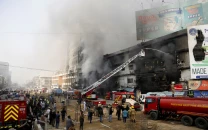Wikileaks cables: ‘Dirty’ politicians and enriched uranium
Leaked cables reconfirm the adage that there are no friends or enemies in <br /> international relations, only interests.

Diplomatic obstacles
The cables released reconfirm some of the diplomatic obstacles Pakistan faces under the rule of President Zardari, including issues raised by countries it considers to be strong allies.
In a July 2007 meeting, Abu Dhabi Crown Prince Mohammed bin Zayed (MbZ) is quoted saying Zardari is “dirty but not dangerous,” and (former) prime minister (Nawaz) Sharif is “dangerous but not dirty - this is Pakistan.”
A cable sent from the US embassy in Riyadh on February 11, 2010 states that the Saudi King Abdullah considers Zardari the biggest obstacle to “the government’s ability to move unequivocally to end terrorist safe havens there.” The king is quoted as saying about Zardari, “When the head is rotten, it affects the whole body.”
Saudi Arabia has been known to be closer to Sharif than Zardari and his widow Benazir Bhutto. Nonetheless, the characterisation of Zardari as the primarily obstacle in the fight against the Taliban is a curious one since the military has always been considered more reluctant to fight militancy than the civilian set-up.
A cable sent by the US Ambassador to the UAE on August 31, 2009 casts Zardari in a better light. Zayed is described as being very supportive of Pakistan and Zardari in particular and is more critical of the US for not providing Pakistan with actionable intelligence with which to take on the Taliban.
A memo dated February 9, 2010 details a briefing given to Admiral Mike Mullen about the UAE-Pakistan relationship: “The Al Nahyan family had a long-standing relationship with former prime minister Benazir Bhutto, and this has transitioned to support for her husband, Asif Ali Zardari, but the UAE stays in touch with all elements on the Pakistani scene, including Musharraf.”
Interestingly enough, Mullen is told, “Zayed will be very interested in your dialogue with General Kayani.”
France also shared its concerns. In a meeting on February 8, 2010, France’s Defence Minister told US Secretary of Defence Robert Gates he had doubts about the willingness of the Pakistan government to fight extremists at home.
Relations with other countries, however, are shown to be strong. A leaked cable from Ankara dated February 25, 2010, reveals that Turkey kept India out of the Afghanistan Neighbours Summit “out of deference to Pakistani sensitivities.” But even this cable reflects poorly on Zardari’s hold over power as one Turkish official is quoted saying that the military was displeased with the president and, while senior army officials did not want to intervene at the moment, may soon run out of patience.
Nuclear concerns
Doubts and security fears about Pakistan’s nuclear weapon programme ran high in diplomatic circles, particularly – as many have suspected – among Americans.
According to the New York Times, US ambassador to Pakistan Anne Patterson reported in 2009 that Pakistan was refusing to schedule a visit by technical experts. The visit was reportedly part of US efforts to remove highly enriched uranium from a research reactor.
Foreign Ministry spokesperson Abdul Basit told Reuters that the nuclear reactor in question had been provided by the US in the 1960s. He said the Americans wanted the fuel back because they said it was their property.
“We said no, because it’s now our property and we will not return it,” Basit said. “This only shows that Pakistan is very sensitive about its nuclear programme and will not allow any direct or indirect foreign intrusion.” Contrary to popular belief, the US was not alone in worrying about the nuclear programme, as Russia, Lebanon and Israel also shared their doubts with visiting Americans.
Former foreign minister Khurshid Kasuri told Express 24/7 that the concerns revealed in the WikiLeaks documents were not new. “They are no surprise. We were always acting on the assumption that we have to be extra careful and we did manage to convince the international community that despite all the precautions that we took our (nuclear) programme was really safe.”
Russia raised the issue of the security of Pakistan’s nuclear facilities in a meeting with the US last year, and asked the US for any additional information about the protection and transportation of nuclear and missile weaponry in Pakistan.
In a 2009 memo, Israel’s Defence Minister Ehud Barak is quoted describing Pakistan “as his ‘private nightmare,’ suggesting the world might wake up one morning ‘with everything changed’ following a potential Islamic extremist takeover.”
In a meeting in 2007, Mossad chief Meir Dagan shared his concerns about Pakistan’s nuclear programme ending up “in the hands of an Islamic regime”.
Lebanon’s caretaker prime minister Fouad Siniora told General David Petraeus in June 2009 that he had “heard a rumour that Pakistan was ready to sell some of its nuclear stock to other countries. General Petraeus responded that this was almost certainly a rumour, but he refused to discount the possibility that Gulf states may ‘start shopping’ if Iran acquired a nuclear weapon capability.”
The Musharraf role
A number of memos detail support for former President Pervez Musharraf from world leaders.
When Zayed (MbZ) was asked by the ambassador to the UAE in 2005 about a meeting with Musharraf, he “chuckled and asked why the US government ‘always’ convinced the Pakistanis to delay news of the capture of senior al Qaeda operatives such as Abu Faraj alLibbi. MbZ went on to congratulate Washington for its decision to allow US firms to bid for contracts to provide F-16s and other defence technology to Pakistan. It was important to support Musharraf as he battled the terrorists, he emphasised. While the Indians had and would continue to balk at the decision, the region needed Musharraf to stay strong. There was no alternative leader in sight, MbZ opined.”
His view resonated in Israel as well. In a memo about a July 12, 2007 meeting, the Mossad chief is quoted saying, “We have to keep (President Pervez) Musharaf in power.”
In the neighbourhood
The leaked documents also reconfirm reports about the relationship Pakistan has with its neighbours. Pakistan’s poor relations with Afghanistan – also alluded to in intelligence reports about the Afghan war released by WikiLeaks earlier this year - are reflected in a cable that reports on a meeting between the US Embassy in Kabul and Ahmed Wali Karzai, the brother of Afghan President Hamid Karzai. Reflecting the official Afghan view of Pakistan, Ahmed Karzai says that Taliban leader Mullah Baradar was only captured by Pakistan because he and other Taliban leaders were “prepared to discuss reintegration with the Karzai government.” Ahmed Karzai added that, “Senior Taliban fighters in Pakistan may be prepared to reintegrate ... but are forced by the Pakistan Government to continue to fight.”
A 2009 report filed from Azerbaijan states that the reason Iran postponed the completion of the rail-link between Pakistan and Iran was due to the violence in Sistan-Balochistan, which is “mirrored and influenced” by similar events in Pakistan’s Balochistan province. A source reported that Iran had asked Pakistan to “establish a new, ‘more secure and modern’ route” in 2008 but it had refused to do so.
Spying on the UN
One of the most notable documents leaked is a memo to US diplomats, asking them to provide intelligence about United Nations (UN) officials, including information on Afghanistan such as “Afghan, Pakistani and Iranian intentions or reluctance to secure and safeguard UN and non-governmental organisation personnel.”
Attacks on UN personnel in Afghanistan have been attributed to the Taliban and the Haqqani network, which is reportedly based in Pakistan.
The memo also asks for reports on discussions about the United Nations Security Council (UNSC) expansion among countries, including “the Uniting for Consensus group (especially Mexico, Italy, and Pakistan) that opposes additional permanent UNSC seats.”
The State Department also asked for personal details such as, “Biographical and biometric information on key Non-Aligned Movement/G-77/Organisation of Islamic Countries Permanent Representatives and information on their relationships with their capitals.” Countries it requested this information about include Pakistan and India.
Pakistan’s permanent representative to the UN Abdullah Hussain Haroon told The Express Tribune, “I don’t know why exactly they would want that. Anyone who applies to the US now already gives their biometric data and for example, I have a machine-readable passport which already has this information.”
Haroon said that the “UN is protected by its own conventions and is in itself a state,” and these conventions “appear to have been breached” by the memo. “Asking for encrypted messages of the Secretary General etc is a violation and a very regrettable matter. The UN works for the entire world and has private correspondents. Breaching their privacy is a very serious matter. I believe it is reprehensible and should not have reached such a stage.”
Up next
There are reportedly over 80 documents pertaining to Pakistan among the hundreds of thousands of cables WikiLeaks will release in the next few months and is described as the biggest leak of confidential documents in history.
Published in The Express Tribune, November 30th, 2010.



















COMMENTS
Comments are moderated and generally will be posted if they are on-topic and not abusive.
For more information, please see our Comments FAQ